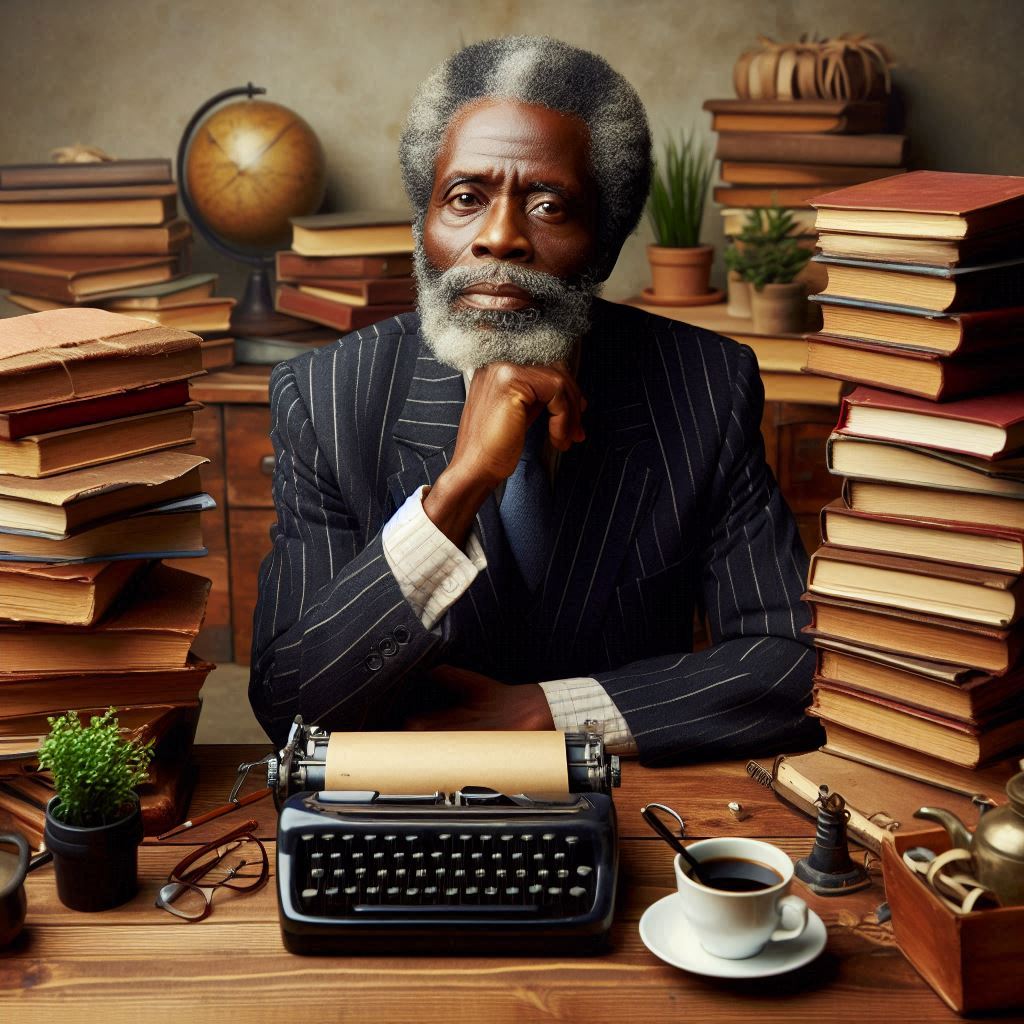Introduction
Embarking on the journey of playwriting opens doors to a realm where imagination meets reality on the stage.
Nigerian playwrights, with their diverse cultural backgrounds and rich storytelling traditions, offer a treasure trove of insights for aspiring writers.
In the vibrant tapestry of Nigerian theater, playwrights weave narratives that reflect the complexities of society, exploring themes ranging from tradition and identity to politics and human relationships.
Learning from these maestros of the stage not only hones the craft of storytelling but also fosters a deeper understanding of cultural nuances and societal dynamics.
Aspiring playwrights gain invaluable lessons. Study Nigerian playwrights for character development, plot construction, and dialogue intricacies.
Their ability to infuse local flavors and universal themes creates a theatrical experience that resonates with audiences worldwide.
Join us on this enlightening journey as we delve into the world of playwriting, guided by the wisdom and creativity of Nigerian playwrights.
Unravel intricacies of the human condition. Celebrate theater’s power to inspire, provoke, and unite audiences globally through their stories.
Research Nigerian Playwrights
Exploring the works of prominent Nigerian playwrights unveils a wealth of inspiration and wisdom for aspiring writers.
These playwrights offer unique perspectives, storytelling techniques, and thematic explorations. Enrich your writing journey, deepen understanding of the craft.
Research Prominent Nigerian Playwrights and Their Work
Begin exploration by delving into the extensive repertoire of iconic Nigerian playwrights. Include Nobel laureate Wole Soyinka, renowned novelist Chinua Achebe, and prolific dramatist Femi Osofisan.
Their contributions to Nigerian theater have left an indelible mark, shaping the landscape of African literature and influencing playwrights worldwide.
The Themes and Styles of Their Plays
Immerse yourself in their works. Pay close attention to recurring themes, narrative structures, and stylistic innovations in Nigerian theater.
Navigate a vast spectrum of topics with depth, nuance, and authenticity. Explore themes of colonialism, cultural identity, socio-political commentary, and human resilience.
How Their Work Can Inspire and Inform Your Own Writing
Critically analyze themes, characters, and narrative techniques used by Nigerian playwrights. Let them inspire and inform your writing.
Draw insights from their storytelling prowess and cultural insights. Infuse your plays with authenticity, resonance, and universal appeal.
Studying Nigerian playwrights offers a gateway. Understand cultural dynamics, historical contexts, and prevalent societal issues in Nigeria and beyond.
Their plays reflect Nigerian history, traditions, and contemporary realities. Provide valuable insights for crafting compelling, resonant narratives globally.
Incorporate Nigerian theater elements into your writing. Connect with audiences deeply, fostering empathy, understanding, and cultural exchange.
Embrace diverse perspectives, voices, and storytelling traditions. Create plays transcending geographical boundaries, resonating with universal truths, honoring Nigeria’s rich cultural heritage.
Generally, delving into the world of Nigerian playwrights provides a fertile ground for aspiring playwrights to cultivate their craft and broaden their horizons.
Their works not only inspire creativity but also foster cultural appreciation, dialogue, and mutual understanding.
Immerse yourself in Nigerian theater. Elevate your writing, contribute to global discourse, and shape the future of theater.
Read: Scholarships for Christian Religious Studies Students
Understand the Structure of a Play
When it comes to writing a play, understanding the structure is essential. A well-structured play can captivate an audience and convey a compelling story effectively.
Let’s break down the components of a play and explore why structure is crucial in crafting a successful play.
Components of a Play
- Acts: Plays are typically divided into acts, which are large sections that encompass multiple scenes.
- Scenes: Acts are further broken down into scenes, which represent specific moments in the play.
- Dialogue: The main form of communication in a play, dialogue helps to advance the plot and develop characters.
- Stage Directions: Instructions provided in the script for actors regarding movements, gestures, and props.
- Character Development: Building well-rounded characters with distinct personalities and motivations.
Importance of Structure
The structure of a play serves as the foundation for the narrative, guiding the flow of events and engaging the audience.
Without a clear structure, a play may lack coherence and fail to resonate with viewers.
A well-structured play can enhance the overall experience for both the audience and the actors, creating a more immersive and impactful performance.
Examples from Nigerian Plays
- “Death and the King’s Horseman” by Wole Soyinka: This play follows a traditional three-act structure, with each act building upon the previous one to create a powerful storytelling arc.
- “The Lion and the Jewel” by Wole Soyinka: This play is structured in two acts, with each act serving as a distinct part of the narrative that contributes to the overall theme of cultural clash and societal values.
- “The Gods Are Not to Blame” by Ola Rotimi: This play is divided into five acts, each revealing a different aspect of fate, destiny, and the consequences of one’s actions.
Ultimately, understanding the structure of a play is essential for any playwright looking to craft a compelling and engaging story.
By breaking down the components of a play, explaining the importance of structure, and providing examples from Nigerian plays, aspiring playwrights can learn how to effectively structure their own works and create impactful theatrical experiences.
Read: Challenges in Teaching Christian Religious Studies
Developing Characters and Dialogue
Creating compelling characters and authentic dialogue lies at the heart of successful playwriting.
Nigerian playwrights, with their rich storytelling tradition, offer invaluable insights into this essential aspect of the craft.
The Process of Creating Well-Rounded Characters
Begin by delving into the process of character development, exploring the intricacies of crafting well-rounded protagonists, antagonists, and supporting characters.
Develop backstories, motivations, and internal conflicts to breathe life into your characters and make them relatable to your audience.
Offer Tips for Writing Authentic and Engaging Dialogue
Next, dive into writing authentic, engaging dialogue. Drive the narrative forward, revealing inner workings of characters.
Pay attention to speech patterns, idiosyncrasies, and subtext to create dialogue that feels natural and dynamic on stage.
Share Insights from Nigerian Playwrights on Character Development
Draw inspiration from Nigerian playwrights who excel in creating memorable characters and compelling dialogue.
Learn from their techniques and approaches to character development, dialogue construction, and thematic exploration.
Nigerian playwrights often infuse their characters with cultural nuances, allowing them to reflect the complexities of Nigerian society.
Incorporate cultural identity, social dynamics, and historical context into characters. Deepen storytelling authenticity, resonating with a diverse audience.
Incorporate diverse perspectives and voices into characters and dialogue. Enrich your play’s tapestry, fostering empathy, understanding, and audience connection.
Embrace the richness of human experiences, emotions, and relationships. Create characters resonating with universal truths, leaving a lasting impact.
Read: Impact of Christian Religious Studies on Nigerian Society

Exploring Themes and Conflict
Themes and conflict play crucial roles in the success of any play. Nigerian playwrights have mastered the art of using these elements to engage their audiences and deliver powerful messages.
Let’s explore how themes and conflict are effectively utilized in Nigerian plays.
Common Themes in Nigerian Plays
- Cultural Identity: Many Nigerian plays delve into the complexities of cultural identity, exploring themes of tradition, modernity, and the clash between the two.
- Politics: Nigerian playwrights often use their work to comment on political issues, corruption, power struggles, and the impact of politics on society.
- Family Dynamics: Family relationships, generational conflicts, and the tension between individual desires and familial expectations are common themes in Nigerian plays.
- Colonial Legacy: The legacy of colonialism, its impact on Nigerian society, and the struggle for independence are recurring themes in Nigerian plays.
By exploring these themes, Nigerian playwrights not only reflect the realities of Nigerian society but also provide a platform for audiences to engage with important social and cultural issues.
The Role of Conflict in Driving the Plot
Conflict is the driving force behind the narrative in any play.
It creates tension, propels the story forward, and keeps the audience engaged. In Nigerian plays, conflict is used skillfully to draw the audience into the narrative and provoke thought.
There are several types of conflict that Nigerian playwrights utilize
- Internal Conflict: The struggle within a character, often involving moral dilemmas or conflicting desires.
- External Conflict: Conflict between characters, societal forces, or external factors that drive the plot forward.
- Man vs. Society: Characters pitted against societal norms, expectations, or injustices.
- Man vs. Nature: Conflict between characters and the natural world, often used symbolically to reflect larger themes.
Through the skillful use of conflict, Nigerian playwrights create dynamic and engaging stories that resonate with their audiences on a deep emotional level.
Examples of Effective Use of Themes and Conflict
Let’s take a look at how Nigerian playwrights effectively combine themes and conflict in their work:
- Wole Soyinka’s “Death and the King’s Horseman” explores the clash between traditional Yoruba beliefs and British colonialism, using conflict to highlight cultural tensions.
- Lola Shoneyin’s “The Secret Lives of Baba Segi’s Wives” delves into themes of polygamy, gender dynamics, and societal expectations, using conflict to reveal the complexities of family relationships.
- Femi Osofisan’s “Women of Owu” tackles issues of war, power, and female agency, using conflict to underscore the devastating consequences of conflict on women’s lives.
- Soyinka’s “The Lion and the Jewel” explores the clash between modernity and tradition in a Nigerian village, using conflict to highlight the struggle for power and control.
These examples demonstrate how Nigerian playwrights masterfully weave themes and conflict together to create thought-provoking and emotionally resonant stories that captivate audiences and leave a lasting impact.
Read: Understanding Mental Health Laws in Nigeria
The Revision Process
When it comes to writing a play, the revision process is crucial for refining your work and making it the best it can be.
It is during this stage that you fine-tune your characters, dialogue, plot, and overall structure to create a cohesive and engaging piece of art.
Here are some tips from Nigerian playwrights on how to perfect your play through revision:
Why Revision is Important
- Revision allows you to improve the clarity and effectiveness of your play.
- It helps you identify areas that need further development or clarification.
- By revising your play, you can address any inconsistencies or errors that may have slipped through during the initial writing process.
- Revision ensures that your play is well-crafted and polished, enhancing its impact on the audience.
Strategies for Refining Your Work
- Take a break after completing your first draft to gain fresh perspective before starting the revision process.
- Read your play out loud to identify any awkward phrasing, pacing issues, or areas that need improvement.
- Focus on one aspect of your play at a time, such as character development, dialogue, or plot, to make the revision process more manageable.
- Solicit feedback from other playwrights, directors, or actors to gain insight into how your play is being received and where it can be strengthened.
Seeking Feedback
- Join a writing group or workshop to receive constructive criticism and support from fellow playwrights.
- Attend readings or workshops where your play is performed to see how it resonates with an audience.
- Work with a mentor or dramaturg who can provide guidance on how to elevate your play to its full potential.
- Consider hiring a professional script consultant to offer expert advice on improving your play.
Tips from Nigerian Playwrights
- “Don’t be afraid to make bold choices and take risks with your play during the revision process.” – Wole Soyinka
- “Trust your instincts and intuition when revising your work, but also be open to feedback and suggestions from others.” – Lola Shoneyin
- “Every word and scene in your play should serve a purpose and contribute to the overall story you are trying to tell.” – Sefi Atta
- “Revision is an ongoing process, so don’t be afraid to revise your play multiple times until you are satisfied with the final product.” – Tess Onwueme
By following these strategies and incorporating feedback, refine your play. Create compelling, impactful theatre resonating with audiences.
Remember that revision is an essential part of the writing process and can ultimately lead to a more polished and successful play.
Finding Inspiration and Developing Your Voice
The journey of playwriting often begins with finding inspiration and developing your unique voice as a writer.
Nigerian playwrights have a rich tradition of storytelling that reflects their diverse cultural heritage and unique perspectives.
Here are some tips on how to find inspiration and cultivate your voice as a playwright:
Finding Inspiration
- Draw from personal experiences: Reflect on your own life experiences and emotions to create authentic and relatable characters and stories.
- Explore Nigerian culture and history: Delve into the rich tapestry of Nigerian folklore, traditions, and history to find unique story ideas.
- Read other plays: Study the works of renowned playwrights, both Nigerian and international, to gain insights and inspiration for your own writing.
- Observe the world around you: Pay attention to current events, social issues, and human behavior to spark ideas for your playwriting.
- Collaborate with other artists: Engage with other creatives, such as actors, directors, and designers, to brainstorm ideas and collaborate on projects.
Developing Your Voice and Style
- Write regularly: Practice is key to honing your craft and developing your unique voice as a playwright.
- Experiment with different genres and formats: Don’t be afraid to step outside your comfort zone and try new styles of writing.
- Be true to yourself: Stay true to your beliefs, values, and experiences to infuse authenticity into your work.
- Seek feedback: Share your work with trusted mentors, fellow writers, or writing groups to receive constructive criticism and improve your writing.
- Embrace your cultural identity: Celebrate your Nigerian heritage and incorporate elements of Nigerian culture into your storytelling.
Nigerian Playwrights and Their Creative Voices
Nigerian playwrights have made significant contributions to the world of theatre with their distinct voices and perspectives.
From Wole Soyinka to Chinua Achebe, these writers have paved the way for aspiring playwrights to showcase their talents.
Here are some Nigerian playwrights who have found their creative voices:
- Wole Soyinka: The first African Nobel Laureate in Literature, Soyinka is known for his powerful dramas that blend Yoruba traditions with Western theatrical techniques.
- Tess Onwueme: A prolific playwright, Onwueme’s works explore gender, politics, and culture, drawing inspiration from her Igbo heritage.
- Biyi Bandele: Bandele’s plays often address social issues in Nigeria, with a focus on political corruption, human rights, and the legacy of colonialism.
- J.P. Clark: A prominent figure in Nigerian literature, Clark’s plays reflect his deep connection to the Niger Delta region and its cultural traditions.
- Lola Shoneyin: Best known for her poetry and novels, Shoneyin’s foray into playwriting explores themes of love, identity, and empowerment.
By finding inspiration in their surroundings, honing their craft, and staying true to their unique voices, Nigerian playwrights have created a rich tapestry of stories that resonate with audiences worldwide.
As you embark on your own playwriting journey, remember to draw on your experiences, experiment with different styles, and embrace your cultural heritage to create meaningful and impactful work.
Conclusion
In closing, Nigerian playwrights offer invaluable insights into the art of playwriting, emphasizing the twin pillars of authenticity and cultural resonance.
Their collective wisdom underscores the need for aspiring playwrights to immerse themselves deeply in their cultural roots while also engaging with universal themes that resonate across borders.
Furthermore, they stress the importance of practice and perseverance in honing one’s craft.
Writing plays is not just about talent; it’s about dedication and discipline.
Nigerian playwrights encourage writers to embrace failure as part of the learning process and to keep pushing forward despite setbacks.
Moreover, they highlight the richness of learning from diverse voices in the theater.
Listening to and engaging with stories from diverse cultures expands horizons, challenges assumptions, and fosters inclusive, impactful work.
The journey of playwriting intertwines personal growth, cultural exploration, and artistic expression.
Aspiring playwrights, heed these lessons from Nigerian playwrights. Embark on your creative journey with passion, persistence, and an open mind.




